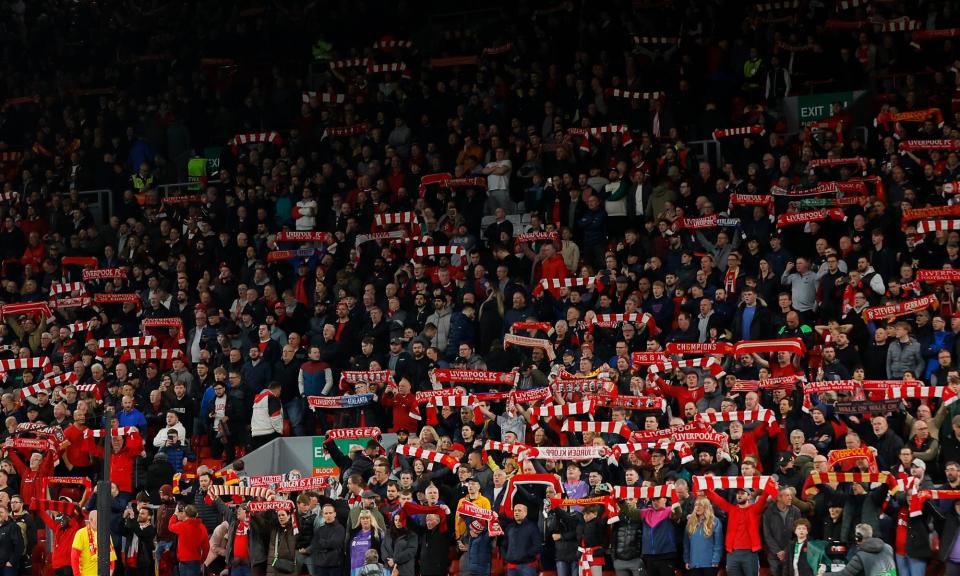Era of frozen Premier League ticket prices is over, expert warns fans

The era of frozen ticket prices is over, a leading football finance expert has warned, as clubs look to recoup money lost from increased costs and stalling broadcast revenues.
Season tickets have gone up at 11 of the 12 Premier League sides to have announced their pricing for next season, with a 2% rise at Liverpool the latest to generate ire among supporters.
Related: Klopp acknowledges Liverpool fans’ protests but wants focus during game
Only Crystal Palace have confirmed a price freeze, with Arsenal, Brentford, Brighton, Burnley, Everton, Manchester City, Manchester United, Sheffield United, Tottenham and West Ham joining Liverpool in increasing ticket costs.
Kieran Maguire, of the University of Liverpool, said clubs were responding to cost pressures that have affected all businesses in recent years. “Clubs have been hit by rises in fixed costs and interest rates, just like every other industry,” he said. “Everyone else has passed on these costs to consumers. I grumble about the cost of a jar of marmite, yet still pay for it. But we hold football clubs to higher values than any other supplier. We feel they should act differently.”
The post-pandemic period has brought rising costs for many match-goers after a decade when season tickets were often frozen. Before this season Manchester United had gone 11 years without a price rise and Liverpool seven.
Arsenal: cheapest £1,073 (up from £974), most expensive £2,050 (up from £1784)
Brentford: cheapest £460 (up from £419), most expensive £815 (up from £549)
Brighton: cheapest £595 (up from £565), most expensive £965 (up from £800)
Burnley: cheapest £352 (up from £335), most expensive £520 (up from £500)
Crystal Palace: cheapest frozen at £545, most expensive frozen at £895
Everton: cheapest £650 (up from £600, family zone is cheaper at £555), most expensive £740 (up from £690)
Liverpool: cheapest £713 (up from £699), most expensive £904 (up from £886)
Manchester City: cheapest £540 (up from £385), most expensive £1,080 (up from £1,030)
Manchester United: cheapest tbc* (up from £551), most expensive tbc (up from £1,007)
Sheffield United: cheapest £403 (up from £380), most expensive £513 (up from £490)
Tottenham: cheapest £856 (up from £807), most expensive £2,147 (up from £2,025)
West Ham: cheapest £345 (up from £310), most expensive £1,175 (up from £1105)
* Manchester United have informed season-ticket holders of a price rise but not publicly released the 2024-25 prices
“Between 2010 and 2019, retail inflation was low and Premier League TV revenues were growing quickly,” Maguire said. “In 2014 the league saw broadcast revenues rise by 70%. In 2017 they did the same again. To be seen to be targeting fans when money is tumbling from the sky would look bad.
“But since then domestic revenues have effectively flatlined, so how do clubs generate more money? The price of merchandise has gone up, and ticket prices are another lever they can pull.”
Maguire observed that after United raised their season ticket prices last year, it affected the club’s bottom line. “In 2011 the club’s match-day revenue stood at £111m,” he said. “In 2019 it was £111m and in 2022 following the return from Covid it was also £111m. In 2022-23 it went from £111m to £136m”.
Other clubs, in Maguire’s opinion, have watched United’s results and taken note. “People will raise prices because they know people are willing to pay it,” he said. “Liverpool could sell 80,000 seats at this price.”
While the business arguments stack up, the cultural significance of football means clubs will not be insulated from criticism. “Economics and business 101 says that if you can sell out of a product at a certain price, then it’s too cheap,” Maguire said. “Whether this is the right thing to do in the national sport is a different question and if you believe in the idea that football is the opera of the working class, then absolutely it is not.”

